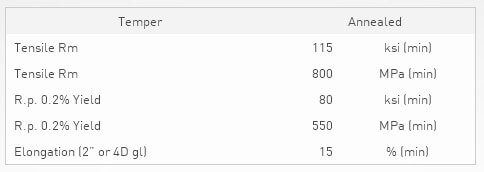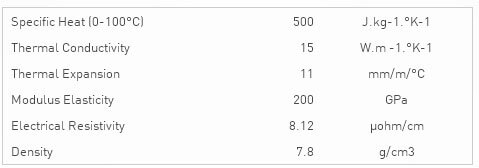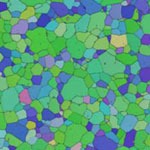
Tubes:
Ritinox Overseas LLP (India) is a major stockholder and distributor of Stainless Steel Tube, Pipe & Hollow Bar.
We have been established in the India for over 10 years and have developed an enviable reputation in the market for quality and reliability, for both product and service.
With the support of the our long standing relations with mills across the world we are able to draw upon a stocking capacity highest in India. Thus, as well as being able to offer “fast-track” deliveries from our own stock, we also have the possibility to offer large quantities for long-term projects using mill stock and production if necessary based upon new manufacture. Our particular strengths lie in the supply of Stainless, Duplex and Super Duplex, High Nickel Aloy and Titanium of which we are one of the largest stockholders. Our products are accepted by the majority of international oil companies.
| Duplex steels are easily welded and formed, similar to austenitic grades. Depending on chromium, nickel and molybdenum content, duplex stainless steels are divided into four main categories: lean duplex, duplex, super duplex and hyper duplex. This family of alloys has great advantages in both material and engineered fabrication costs. |  |
Typical applications for this alloy group include heat exchanger tubes, umbilicals, structural tanks, pulp and paper making equipment, pipes and fittings, and seawater handling systems.
Fine Tubes manufactures duplex stainless steel tubes in the following alloys:

SUPER DUPLEX • UNS S32750 • WNR 1.441
Super Duplex stainless like S32750, is a mixed microstructure of austenite and ferrite (50/50) which has improved strength over ferritic and austenitic steel grades. The main difference is that Super Duplex has a higher molybdenum and chromium content which gives the material greater corrosion resistance than standard duplex grades.
The balanced duel phase microstructure combines high strength with cost effective corrosion resistance particularly in high chloride environments. Super Duplex has the same benefits as its counterpart – it has lower alloying costs when compared with similar ferritic and austenitic grades with equipment corrosion resistance in chloride containing environments due to the material’s increased tensile and yield strength. In many cases this gives the purchaser the welcomed option of purchasing smaller thicknesses without the need to compromise on quality and performance.
Available tube product forms
- Abrasion resistance
- Straight
- Coiled
- Seamless
- Seam welded, cold redrawn and annealed
Typical Applications
- Subsea control lines
- Offshore platforms
- Fire-fighting systems
- Injection & ballast water systems
- Heat exchangers
Typical manufacturing specifications
- ASTM A789
- ASME SA-789
- ASME SA-790
- Also individual customer specifications
Industries predominantly using this grade
- Chemical processing
- Oil and gas
TECHNICAL DATA
Mechanical Properties

Physical Properties (Room Temperature)

Chemical Composition (% by weight)

NICKEL ALLOY TUBES
Nickel based alloys are very useful materials for the manufacture of high quality tubing products. One of the key reasons is that they offer excellent corrosion resistance in both aqueous and high temperature applications.
| In addition to their high melting points and resistance to oxidation and corrosion, nickel alloys are very ductile. They can be electroplated and are easily welded, making them suitable for use in industries where very high and low temperatures come into play. |

|
Nickel based alloys have a higher ability to accept alloying elements in solid solution than other stainless steel or iron-based alloys. They can therefore maintain higher metallurgical stability. The combination of high alloying with multiple elements can provide very good corrosion resistance in a wide range of environments while still maintaining good welding and forming characteristics.
Nickel alloys are excellent for heat exchangers in the chemical processing and nuclear industries. They’re used in steam generator tubing in the nuclear power industry, in high-temperature aircraft systems, and in oil and gas extraction programmes where corrosion-, pressure- and temperature-resistant tubing is required. Their corrosion resistance also makes them useful in desalination equipment.
Fine Tubes manufactures precision tubes in the following nickel based alloys:

TITANIUM TUBES
Because of its strength, unique density and corrosion resistance, titanium has found applications in many industries. For high quality tubing products, it’s often a better substance to use than competing materials like stainless steels or super alloys.
| The density of titanium is about 60 per cent of that of steel- or nickel-based alloys giving significant weight savings in aerospace structures. The tensile strength is better than that of austenitic or ferritic stainless steels. Titanium is exceptionally corrosion resistant and exceeds the resistance of stainless steels in most environments. The metal is non-magnetic too, and has good heat transfer properties, with a melting point higher than steel alloys. |

|
Titanium is easily worked. Combine that with its strength, stiffness, toughness and high melting point and it’s a very desirable metal for high performance metal tubing. We manufacture titanium tubes used in aircraft hydraulic systems, medical implants, offshore drilling rig components, subsea equipment, and marine and chemical processing plants.
Fine Tubes manufactures titanium tubes in the following alloys:

ZIRCONIUM TUBES
At Fine Tubes we commonly use zirconium-based alloys to manufacture nuclear reactor components such as fuel claddings, coolant channels, pressure tubes and other equipment used in a reactive environment.
| Zirconium alloys have low neutron absorption, high strength and high corrosion resistance under different operating conditions. Unlike stainless steels the texture of a zirconium product will have a significant effect on its performance because irradiation creep, yield strength, and stress corrosion cracking resistance are strong functions of texture. |

|
Fine Tubes can manufacture precision tubes in the following Zirconium alloys:

